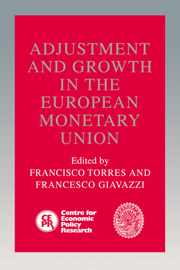Book contents
- Frontmatter
- Contents
- List of figures
- List of tables
- Preface
- List of contributors
- Foreword
- 1 Introduction
- 2 Economic and monetary union: critical notes on the Maastricht Treaty revisions
- Discussion
- 3 The design of optimal fiscal rules for Europe after 1992
- Discussion
- 4 Contracts, credibility and common knowledge: their influence on inflation convergence
- Discussion
- 5 Inflation in fixed exchange regimes: the recent Portuguese experience
- Discussion
- 6 Models of economic integration and localized growth
- Discussion
- 7 Shocking aspects of European monetary integration
- Discussion
- 8 Lessons of Massachusetts for EMU
- Discussion
- 9 Financial and currency integration in the European monetary system: the statistical record
- Discussion
- 10 Currency substitution: from the policy questions to the theory and back
- Discussion
- 11 Coordination of capital income taxes in the economic and monetary union: what needs to be done?
- Discussion
- Index
4 - Contracts, credibility and common knowledge: their influence on inflation convergence
Published online by Cambridge University Press: 29 January 2010
- Frontmatter
- Contents
- List of figures
- List of tables
- Preface
- List of contributors
- Foreword
- 1 Introduction
- 2 Economic and monetary union: critical notes on the Maastricht Treaty revisions
- Discussion
- 3 The design of optimal fiscal rules for Europe after 1992
- Discussion
- 4 Contracts, credibility and common knowledge: their influence on inflation convergence
- Discussion
- 5 Inflation in fixed exchange regimes: the recent Portuguese experience
- Discussion
- 6 Models of economic integration and localized growth
- Discussion
- 7 Shocking aspects of European monetary integration
- Discussion
- 8 Lessons of Massachusetts for EMU
- Discussion
- 9 Financial and currency integration in the European monetary system: the statistical record
- Discussion
- 10 Currency substitution: from the policy questions to the theory and back
- Discussion
- 11 Coordination of capital income taxes in the economic and monetary union: what needs to be done?
- Discussion
- Index
Summary
Introduction
In recent years, countries in the European monetary system (EMS) have pegged their exchange rates to the Deutschmark in an attempt to reduce their inflation to German levels. Although there have been no realignments since 1987, inflation rates have been slow to adjust. Indeed, from the evidence of European inflation indices over the period 1987–91, the authors of the report on monitoring European integration (CEPR 1991) concluded: ‘There is no doubt … that inflation convergence has not occurred and it is not occurring. The differential between higher-inflation countries and Germany has recently fallen; but this has been almost entirely due to a surge in the German inflation rate which is believed to be temporary’. We examine three possible reasons for the sluggish inflation response observed in the EMS.
Some observers have stressed the role of staggered wage setting in perpetuating inflation and have recommended synchronizing pay settlements as an institutional solution, see for example Layard (1990). This chapter begins, therefore, with an investigation of the link between inflation persistence and overlapping contracts in the rational expectations models of John Taylor and Stanley Fischer (where wage settlements are for two periods, but two groups alternate in making settlements). We do find some inflation persistence, but only for one period.
- Type
- Chapter
- Information
- Adjustment and Growth in the European Monetary Union , pp. 93 - 122Publisher: Cambridge University PressPrint publication year: 1993

